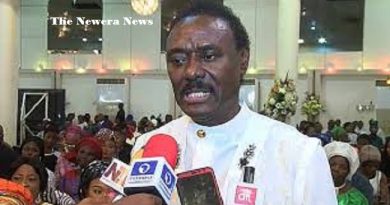N2.67bn School Feeding Fraud: Adamu Adamu Defends Minister
The Minister of Education, Adamu Adamu, defends the ministry’s involvement in the alleged School feeding fraud rocking the ministry.
N2.67Billion School Feeding Fraud allegation is raising a lot of questions with no answer in sight.
Adamu defended the minister, says the ministry is not involved in the N2.67 billion fraud alleged by the Independent Corrupt Practices and Other Related Offences Commission (ICPC).

Bolaji Owasanoye, ICPC chairman, disclosed on Monday that the said sum paid to some federal colleges for school feeding during the COVID-19 lockdown ended up in private bank accounts.
Federal government colleges (unity schools) are under the ministry of education.
When asked to comment on the allegation, Newera News gathered that Adamu insisted that his ministry does not handle such programmes.
Pointing a finger, he said the office of the vice-president and that of the ministry of humanitarian affairs, disaster management and social development should be asked.
“The Federal Ministry of Education doesn’t handle the issue.”
Also separating themselves, Laolu Akande, media aide of Vice-President Yemi Osinbajo, told Newsmen that the ICPC chairman was not referring to the homegrown school feeding programme which was formerly supervised by the office of the vice-president.
”If you read the speech, you will see clearly that ICPC was not referring to the National Homegrown School Feeding Programme,” he said.
Sadiya Umar Farouq, humanitarian affairs minister, earlier said her ministry has no link to the alleged fraud.

Umar Farouq said her ministry is responsible for the feeding of pupils in primaries 1-3 in select public schools across the country under the homegrown school feeding programme, not the feeding of college students.
The ICPC later clarified the statement of its chairman.
”The Commission wishes to clarify that the “school feeding” referred to by the Chairman of ICPC was the feeding of boarding students in Federal Government Colleges, who were all at home during the COVID-19 lockdown.
This is NOT the Home-Grown School Feeding Programme being managed by the Federal Ministry of Humanitarian Affairs, Disaster Management and Social Development,” it said.
Outburst by Nigerians
You will recall that Nigerians kicked against President Muhammadu Buhari’s idea about the continuation of the feeding of the school children during the pandemic.
They raised their voices to disapprove of the intention because they saw that as unwise. Some questioned why the government should expose school children to the risk of contracting the virus by bringing them to school in order to feed them. Some went as far as calling the programme a scam because they believed that it is set up by the government officials to siphon public funds.
All in all, the general public were not in support of the programme. But what could be seen during the flag-off, this initiative is one of the best ways of providing palliatives to these masses if it is well monitored.
The agitation of Nigerians against this programme may seem too harsh but it helped to shape the way the Federal Ministry of Humanitarian Affairs, Disaster Management and Social Development (FMHDSD) is implementing the programme right now.
On Thursday, 14 May 2020, FMHDSD, in collaboration with the World Food Programme (WFP), flagged off the National Home Grown School Feeding Programme (NHGSFP) at Kuje Central Primary School, Kuje Abuja. At this event, the Minister of FMHDSD, Sadiya Umar-Farouq, explained that the programme targets children in Primary 1 – 3 in public primary schools.
She explained that they will work for hand in hand with participating states, whereby they will adhere to the structures and data provided by the state for the distribution of food.
The flag-off of this programme annoyed more Nigerians because they didn’t see how food could possibly be distributed to millions of children that fall within this category. Some went as far as accusing the government of going against the demands of the masses, which they saw as dictatorial. But from what happened in Kuje Central Primary School Abuja, it will be noticed that the lockdown feeding of school children is an initiative that alleviates the sufferings of many Nigerians, at least to some extent.
From the video clip of the flag-off shared in FMHDSD Twitter page, @FMHDSD, the following observations were made:
Absence of Children
Contrary to what Nigerians thought, the food was not distributed to children. Their parents were the ones that came in their place.
Distribution of Uncooked Food
One of the worries many Nigerians expressed in social media was the hazards surrounding sharing cooked foods to children. But, as mentioned earlier, the FG listened to the voices of the citizens and made necessary adjustments.
The Use of Vouchers
The FG, or the FCT council I guess, first distributed vouchers with barcodes to affected parents. These parents came with their vouchers, submitted them for verification and went to the food collection centre when the authenticity of their vouchers had been ascertained. This ensures that dubious activities were reduced to the barest minimum.
We encourage you to keep a date with us as we uncover the truth.
Like our page and share.




